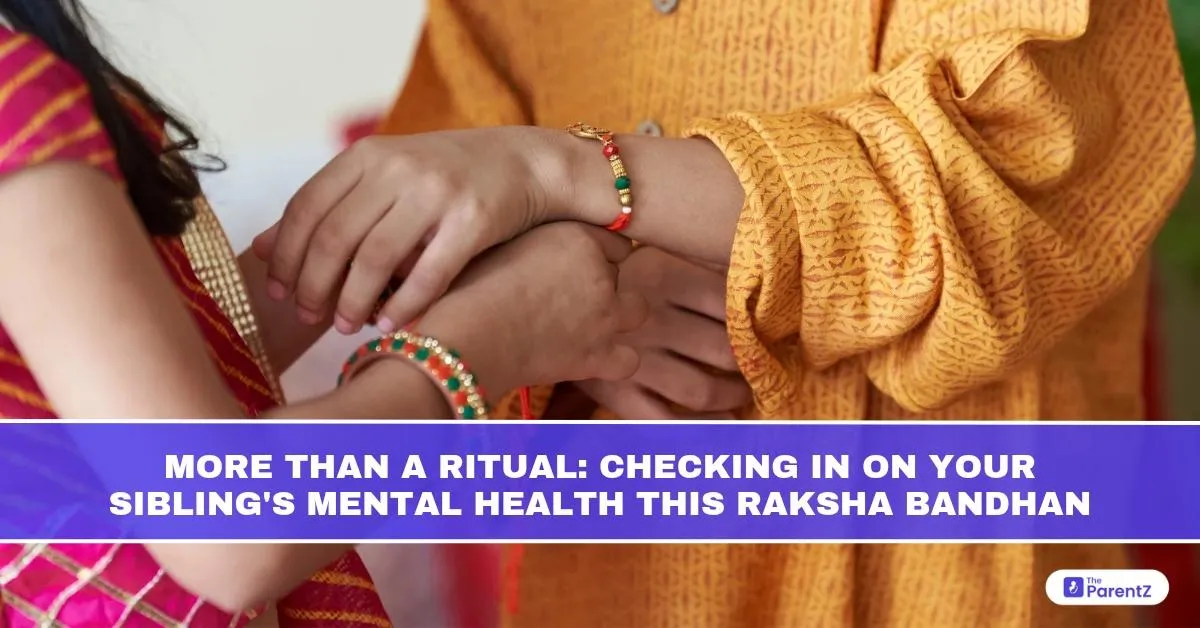“The kindest rakhi you can tie is not on their wrist but around their heart.”
Raksha Bandhan has always stood for protection, a promise of lifelong safety and support between siblings. But in today’s world, where children and teenagers silently struggle with anxiety, body image issues, academic stress, and loneliness, that promise needs to go deeper.
Checking in on your sibling’s mental health is not just a good idea; it’s a lifesaving act of love.
Why This Matters More Than Ever
India has witnessed a sharp rise in mental health concerns among children and adolescents, especially post-pandemic.
- According to a 2024 report by the Indian Journal of Psychiatry, 1 in 5 Indian adolescents show signs of depression or anxiety, and most go undiagnosed.
- The World Health Organization (WHO) states that half of all mental health conditions begin by age 14, but most are not detected or treated in time.
While professional help is vital, early emotional support often comes from the closest relationships, and nothing compares to the safety of a sibling bond.
Signs Your Sibling May Be Struggling (Even if They Don’t Say It)
Children rarely say “I’m anxious” or “I feel low.” But these signs may point to mental health distress:
- Withdrawal from usual play or conversation
- Sudden irritability or aggressive behavior
- Changes in appetite or sleep
- Excessive screen use or isolation
- Drop in school interest or grades
- Constant fear of failing or disappointing parents
If you notice these, don’t dismiss them. Your gentle, loving presence could become the first step to healing.
How to Check In Without Making It Awkward
You don’t need to be a therapist to show care. You just need to be available, observant, and honest.
Here’s how to emotionally check in on your sibling this Raksha Bandhan and beyond:
1. Start Small, But Start
- Say: “Hey, you’ve been a bit quiet lately. Want to go for a walk or draw together?”
- Use shared activities drawing, cleaning the room, even gaming—as a gateway to deeper chats.
2. Make Feelings a Normal Topic
- Introducing “Emotion of the Day” during meals or before bedtime: “What made you happy, sad, or nervous today?”
- Normalize both negative and positive emotions without judgment. This builds what psychologists call emotional literacy—a key tool for lifelong resilience.
3. Avoid Lectures. Offer Listening.
- Don’t say: “It’s just in your head.”
- Say: “That sounds tough. I’m here. Want to talk about it more?”
- Active listening builds trust. NHS’s child mental health guidelines highlight that feeling heard is a more powerful intervention than premature advice.
4. Create a Ritual of Safety
- Start a weekly “sibling circle” tradition—light a candle, sit together, and share one thing bothering you.
- Make it sacred. No teasing. No interruptions. Just space.
5. Encourage Professional Help Without Stigma
- Say: “Just like we visit a dentist for a cavity, we can visit a therapist if our heart feels heavy.”
- Offer to go along or help them talk to a parent or counselor.
Kids Helping Kids: Real Examples That Inspire
- Zaira Wasim, former Bollywood actor, openly shared that support from her younger brother helped her through a phase of depression.
- Indian chess prodigy R Praggnanandhaa has often mentioned how his elder sister Vaishali’s companionship helped him handle early pressure on the international stage.
- Globally, Billie Eilish credits her brother Finneas for being her emotional anchor through struggles with body image and anxiety.
These real-life stories show that a sibling’s quiet support can do what even loud therapy sometimes cannot make you feel less alone.
Celebrate with Care: Rakhi Ideas for Mental Wellness
Move beyond gifts. Use this festival to gift emotional safety:
1. “I’m Here” Card
Write a handwritten card promising your sibling they can talk to you without fear of judgment ever.
2. Sibling Gratitude Jar
Each day until Rakhi, drop in one kind thing you notice about them. Open it together on Rakhi morning.
3. Memory Walk
Take a stroll through your neighborhood or childhood haunts and share one memory each. Nostalgia reduces stress and builds emotional closeness.
4. Wellness Pledge Together
Together we say: “We promise to talk more, listen without phones, cry without shame, and laugh without limits.”
A Message That Goes Beyond This Day
You don’t have to understand mental health to care deeply.
You don’t need fancy words to be someone’s anchor.
Just look into their eyes, squeeze their hand, and say:
“If you ever feel lost, you don’t have to find the way alone. I’ll walk with you.”
This Raksha Bandhan, tie a rakhi not just around the wrist but around the heart.
And promise each other a world where no emotion has to be hidden. No sadness has to be worn in silence.





Be the first one to comment on this story.